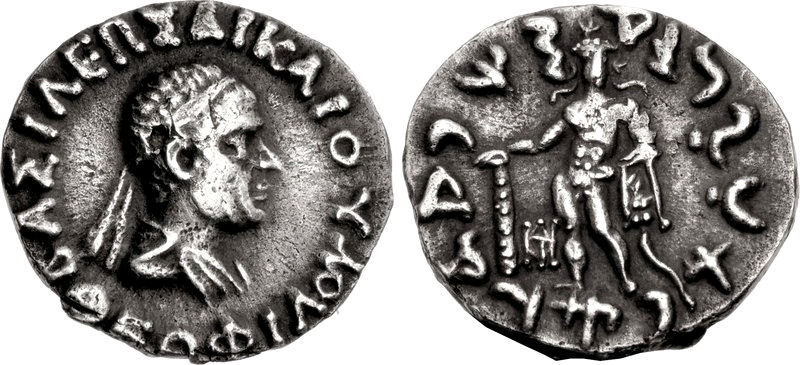Theophilos (king) on:
[Wikipedia]
[Google]
[Amazon]
 Theophilus Dicaeus ( grc, Θεόφιλος Δίκαιος, Theophilos Dikaios) was a minor
Theophilus Dicaeus ( grc, Θεόφιλος Δίκαιος, Theophilos Dikaios) was a minor
Image:Theophilos-634.jpg,
 Theophilus Dicaeus ( grc, Θεόφιλος Δίκαιος, Theophilos Dikaios) was a minor
Theophilus Dicaeus ( grc, Θεόφιλος Δίκαιος, Theophilos Dikaios) was a minor Indo-Greek
The Indo-Greek Kingdom, or Graeco-Indian Kingdom, also known historically as the Yavana Kingdom (Yavanarajya), was a Hellenistic-era Greek kingdom covering various parts of Afghanistan and the northwestern regions of the Indian subcontinent ( ...
king who ruled for a short time in the Paropamisadae
Paropamisadae or Parapamisadae (Greek: Παροπαμισάδαι) was a satrapy of the Alexandrian Empire in modern Afghanistan and Pakistan, which largely coincided with the Achaemenid province of Parupraesanna. It consisted of the districts ...
. He was possibly a relative of Zoilus I and is only known from coins. It is possible that some of Theophilus' coins in fact belong to another ruler, in Greek Bactria, during approximately the same period.
Time of reign
While Bopearachchi suggests c. 90 BCE, R. C. Senior believes that Theophilus ruled in the 130s BCE. Both numismatics do however suggest that the reigns of Theophilus andNicias
Nicias (; Νικίας ''Nikias''; c. 470–413 BC) was an Athenian politician and general during the period of the Peloponnesian War. Nicias was a member of the Athenian aristocracy and had inherited a large fortune from his father, which was inve ...
were adjacent.
Coins of Theophilos
Just like Zoilus I, Theophilus struck Indian silver coins with Heracles, a common symbol of the house ofEuthydemus I
Euthydemus I (Greek: , ''Euthydemos'') c. 260 BC – 200/195 BC) was a Greco-Bactrian king and founder of the Euthydemid dynasty. He is thought to have originally been a governor (Satrap) of Sogdia, who seized the throne by force from Diodotus I ...
, and the epithet Dikaios/Dhramikasa ''"The Just/Follower of the Dharma".'' The monograms are mostly the same as those of Nicias
Nicias (; Νικίας ''Nikias''; c. 470–413 BC) was an Athenian politician and general during the period of the Peloponnesian War. Nicias was a member of the Athenian aristocracy and had inherited a large fortune from his father, which was inve ...
. The bronzes have similar inscriptions.
Bronzes of Theophilos:
Heracles
Heracles ( ; grc-gre, Ἡρακλῆς, , glory/fame of Hera), born Alcaeus (, ''Alkaios'') or Alcides (, ''Alkeidēs''), was a divine hero in Greek mythology, the son of Zeus and Alcmene, and the foster son of Amphitryon.By his adoptiv ...
with lion skin, and his club on the reverse.
A Bactrian king Theophilus?
There is a wholly different, and very rare, Attic-weight coinage of a king Theophilus. Found in Bactria, these coins feature a reverse with a seated Athena with Nike, a different title Autokrator "Autocrat King" ( grc, ΒΑΣΙΛΕΩΣ ΑΥΤΟΚΡΑΤΟΡΟΣ), and also a separate monogram. Although this is not a very common occurrence on Indo-Greek coins, the coins of Theophilus have generally been accepted as belonging to one unique king. Bopearachchi has supported this proposition by pointing at the similarity between the portraits and the identical treatment of the diadem (one end straight, one end crooked). Against this, JakobssonJakobsson, J: ''Theophilos Autokrator, a last Bactrian king?'' ONS Journal 202 (2010). argues that the coins issued by the later Indo-Greek kings for export into Bactria were consistently similar to these kings' regular Indian coinage. Consequently, the coins of Theophilos Autokrator were not such export issues, but should belong to a Bactrian ruler. Jakobsson suggests that Theophilus Autocrator was a Bactrian princelet who briefly maintained himself in some part of Bactria, after the Hellenistic kingdom there had been vanquished by nomads, presumably in the 120s BCE.See also
* Greco-Bactrian Kingdom *Greco-Buddhism
Greco-Buddhism, or Graeco-Buddhism, is the cultural syncretism between Hellenistic culture and Buddhism, which developed between the fourth century BC and the fifth century AD in Gandhara, in present-day north-western Pakistan and parts of nort ...
* Indo-Scythians
Indo-Scythians (also called Indo-Sakas) were a group of nomadic Iranian peoples of Scythian origin who migrated from Central Asia southward into modern day Pakistan and Northwestern India from the middle of the 2nd century BCE to the 4th centu ...
* Indo-Parthian Kingdom
The Indo-Parthian Kingdom was a Parthian kingdom founded by Gondophares, and active from 19 CE to c. 226 CE. At their zenith, they ruled an area covering parts of eastern Iran, various parts of Afghanistan and the northwest regions of the Indian s ...
* Kushan Empire
Notes
References
* ''The Greeks in Bactria and India'', W.W. Tarn, Cambridge University Press. {{DEFAULTSORT:Theophilos Indo-Greek kings 1st-century BC rulers in Asia